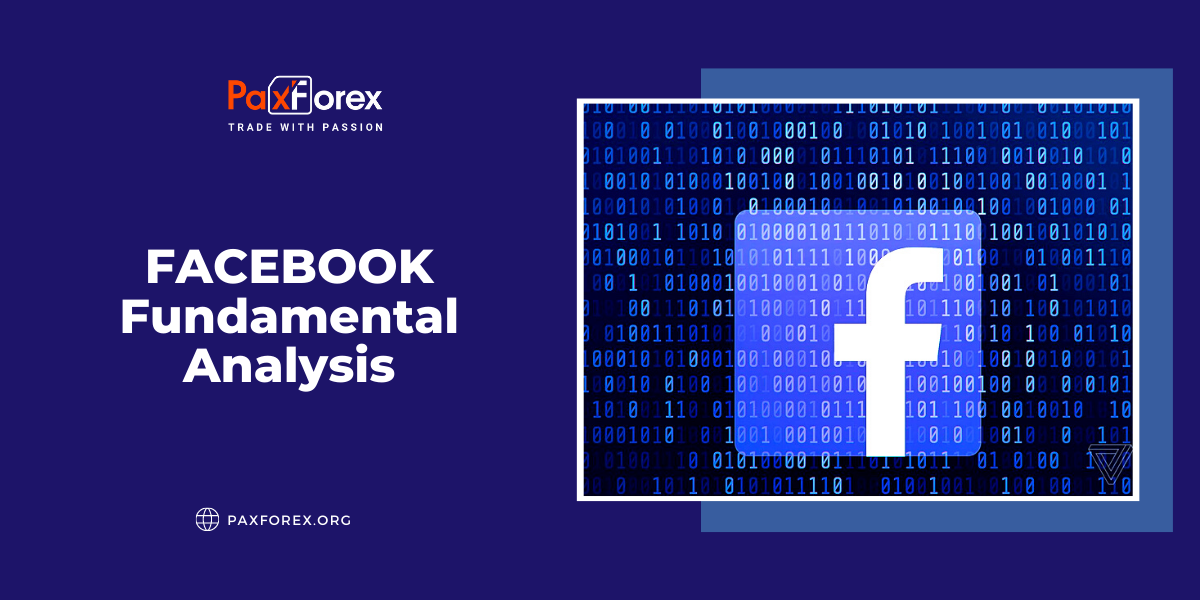
Source: PaxForex Premium Analytics Portal, Fundamental Insight
Meta Platforms shares gained 18% Friday after the company released its Q1 earnings report.
The company's revenues rose 7% YoY to $27.91 billion, $310 million less than analysts' estimates but in line with its previous guidance of 3% to 11% growth. The company's net income fell 21% to $7.47 billion, or $2.72 per share, but still, beat analysts' consensus by $0.17.
Meta's report was mixed, but investors have already tempered their anticipations after the release of a disappointing Q4 report in February of this year. Even after the latest surge following the release of the report, the stock is still down nearly 40% year-over-year.
Let's take a look at why investors breathed a sigh of relief after Meta's latest earnings report - and whether the company's stock is worth buying again as a reversal play.
Meta stock has collapsed this year for four main reasons: Facebook lost its first-ever daily active users (DAU) in the fourth quarter, Apple's iOS privacy changes cut ad sales, the company admitted that TikTok is becoming a major competitor, and pledged to pour more money into its loss-making Reality Labs division.
This combination of slowing growth and rising costs worried investors, and rising interest rates made matters worse by alienating investors from tech stocks. Thus, investors were already preparing for a disastrous first quarter.
Meta's total number of monthly active users (MAP) across its entire family of apps (Facebook, Messenger, Instagram, and WhatsApp) rose 6 percent year over year to 3.64 billion in the first quarter. Daily Active Users (DAP) of this family also grew 6 percent to an average of 2.87 billion in March.
But more importantly, Facebook's daily active users (DAUs) grew 4% year-over-year and 2% sequentially to 1.96 billion, refuting bearish notions that the major social network lacks room for growth. Facebook also increased the number of DAUs in all of its regions except Europe, which lost two million DAUs consecutively after Russia blocked its services in early March.
Total ad impressions on the Meta family of apps were up 15% over last year, but the average price per ad was down 8%. During the report, CFO Dave Wehner largely attributed the decline to "factors related to the war in Ukraine," but CEO Mark Zuckerberg also said that Apple's privacy update still creates "serious obstacles," causing "signal loss" for targeted ads. However, Zuckerberg still believes that Meta can overcome these problems "overtime" with "the right technology" and investment.
As for TikTok, which is becoming a formidable competitor in the short video market, Zuckerberg said Meta's investment in fresh video content for Facebook and Instagram Reels is paying off. He said that Reels now account for "more than 20 percent" of the time spent on Instagram and that videos account for "50 percent of the time people spend on Facebook."
Meta's Reality Labs business, however, remained at a disadvantage as the company increased spending on VR headsets and the meta-universe ecosystem. Revenues in that segment rose 30 percent from a year ago to $695 million, but the operating loss rose from $1.83 billion to $2.96 billion. This larger loss, as well as Meta's shift toward video (which is harder to monetize), led to a 12 percentage point drop in operating margin to 31%.
In the second quarter, Meta expects revenue of $28 billion to $30 billion, down 4% and up 3% from a year earlier. Analysts were expecting nearly 6% growth.
Wehner also predicts an unfortunate exchange rate to create an additional 3% headwind to Meta's second-quarter year-over-year revenue growth, while Facebook's monthly active users (MAUs) "will remain flat or decline sequentially" as the company continues to lose users in Europe.
For the full year, analysts expect Meta's revenue to grow by 11% and earnings to decline by 11% as the company increases its expenses.
That outlook is unclear, but Meta has markedly lowered its forecast for total expenses this year to $87 billion to $92 billion, down from a previous forecast of $90 billion to $95 billion. The company expects most of that spending to be on the app family, not the Reality Labs business.
Meta stock looks historically cheap at 15 times its earnings forecast because it still faces a lot of challenges in the near future.
Facebook is not compromised, but it needs to stabilize its losses in Europe, overcome Apple's platform changes, and expand its video ecosystem to keep up with TikTok. It is also unclear whether its meta-universe will be able to expand beyond its niche and attract more users. As the company pursues these costly strategies, unpredictable macroeconomic factors could continue to disrupt the growth of its core advertising business.
At these levels, we believe Meta's downside potential is limited. It still has a lot of billets, the stock is cheap, and its business should eventually stabilize. Investors may consider buying some Meta stock right now, but they should temper their near-term expectations as the company shifts gears and transforms its core business over the next few quarters.
As long as the price is below 237.30, follow the recommendations below:
- Time frame: D1
- Recommendation: short position
- Entry point: 199.80
- Take Profit 1: 165.50
- Take Profit 2: 145.00
Alternative scenario:
If the level of 237.30 is broken-out, follow the recommendations below:
- Time frame: D1
- Recommendation: long position
- Entry point: 237.30
- Take Profit 1: 260.00
- Take Profit 2: 288.60













